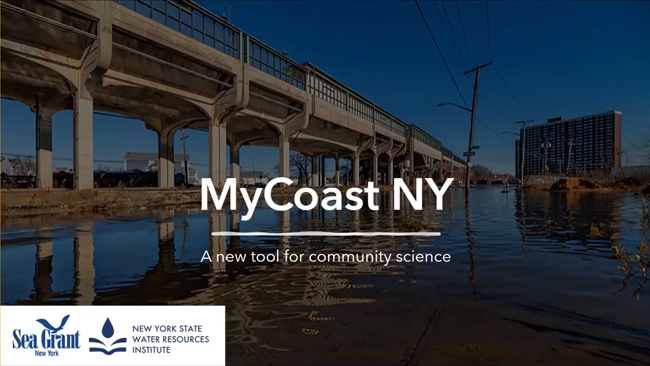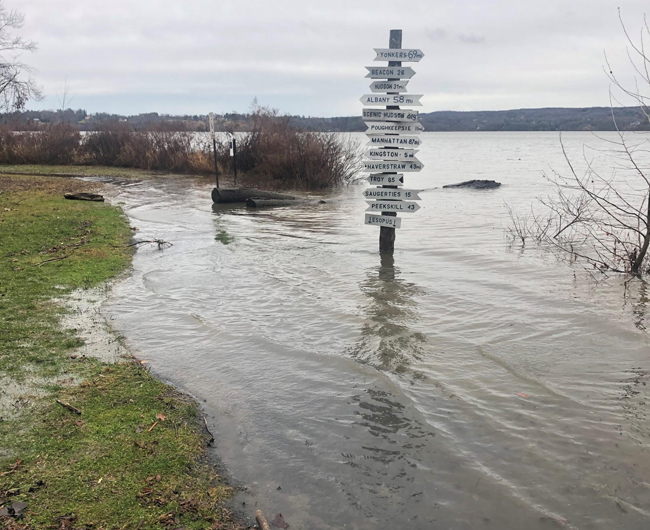Download This: MyCoast NY is a new app that can provide you with a way to locally document increasing flood risk and uncertainty
Contacts:
Kathleen Fallon, NYSG Coastal Processes & Hazards Specialist, E: kmf228@cornell.edu, P: (631) 632-8730
Jessica A. Kuonen, Hudson Estuary Resilience Specialist, NYSG E: jak546@cornell.edu, P: (845) 340-3990 x323
— By Chris Gonzales, Freelance Science Writer, New York Sea Grant
March 9, 2023 - Almost daily we hear about the negative effects of climate change: The Earth is warming. Along with rising temperatures, we’re seeing elevated sea levels and more extreme and hazardous weather events. Some citizens are reaching for their phones, joining efforts to document episodes of flooding and storm damage.
New York State is part of a new wave of these community science efforts.
Keeping up with the changes
New Yorkers are facing increasing flood risk and uncertainty. The Federal Emergency Management Agency (FEMA) says their current flood insurance rate maps (FIRMs)—a common tool for local governments and homebuyers—often underestimate flood risk.
MyCoast NY is a new app that can provide a way to document these changes at the local level.
“Photos of flooding show what will eventually happen more regularly,” said Kathleen Fallon, New York Sea Grant (NYSG)'s Coastal Processes and Hazards specialist. “We’re starting to see these changes taking place now and they give a glimpse of what we can expect in the future.”
“Heavy rains are happening more often across New York as the Northeast becomes wetter,” said Jessica Kuonen, NYSG's Hudson Estuary specialist. “In addition, there’s more coastal flooding from high tides as the sea level rises. MyCoast NY is a way for New Yorkers to document—and learn about—these changes.”

Your phone is a powerful tool
MyCoast NY is a platform for sharing and viewing photos of flooding, storm damage, and shoreline change. The tool automatically links photos to the closest weather station data, tidal gauges for the coast, and river or lake gauges for inland locations.
“Being able to link photos to tide and river gauge data allows us to get a visual of what these future predictions will look like, on the ground,” added Kuonen.
The tool is named MyCoast NY, but it’s not just for the coast. It also applies to people who live across New York—by small lakes, streams, the Great Lakes, and in urban and suburban settings.
MyCoast NY harnesses the power of crowdsourcing—enlisting the services of a large number of people, via the internet—to build a public repository of images. The resulting collection or database provides powerful visuals of flooding and impacts at the local level, engaging members of the community.
Within the app are two different photo reports: Flood Watch and Storm Reporter.
• Flood Watch is for tracking flood events across the state.
• Storm Reporter is for documenting storm damage such as downed trees and utility lines.
All New Yorkers are encouraged to submit photos after flood events and storms. There are four steps to get started:
• Download the MyCoast app or visit MyCoast.org/ny
• Register
• Snap photo
• Submit photo report
Kuonen and Fallon led a webinar to inaugurate the project. It brought attendees who work in meteorology, emergency management and preparedness, public safety, and conservation. One was an avid fisherman. Another worked in rescue operations. A recording of the webinar is available below ...
In this nearly 30-minute webinar, learn more about MyCoast NY, a public web tool empowering New Yorkers to contribute and access photos of flooding, shoreline change, and storm damage.
MyCoast NY is being released by NYSG as a two-year pilot project in partnership with the New York State Water Resources Institute at Cornell University. These two organizations are promoting the tool and invite the public to visit the website or contact Kuonen or Fallon.
“As we promote MyCoast NY in the coming years, we’ll be gathering information about how people are using the photo reports in the work they do,” said Kuonen. “We’re excited for this collective effort and to see how New Yorkers utilize the photos for their needs.”

Flooding reaches the Esopus Meadows Preserve in Ulster Park, New York after the Christmas Day storm of 2020. Credit: Angela Schimizzi
More Info: New York Sea Grant
New York Sea Grant (NYSG), a cooperative program of Cornell University
and the State University of New York (SUNY), is one of 34 university-based
programs under the National Oceanic and Atmospheric Administration’s
National Sea Grant College Program.
Since 1971, NYSG has represented a statewide network of integrated
research, education and extension services promoting coastal community
economic vitality, environmental sustainability and citizen awareness
and understanding about the State’s marine and Great Lakes resources.
Through NYSG’s efforts, the combined talents of university scientists
and extension specialists help develop and transfer science-based
information to many coastal user groups—businesses and industries,
federal, state and local government decision-makers and agency managers,
educators, the media and the interested public.
The program maintains Great Lakes offices at Cornell University, SUNY
Buffalo, SUNY Oswego and the Wayne County Cooperative Extension office
in Newark. In the State's marine waters, NYSG has offices at Stony Brook
University in Long Island, Brooklyn College and Cornell Cooperative
Extension in NYC and Kingston in the Hudson Valley.
For updates on Sea Grant activities: www.nyseagrant.org has RSS, Facebook, Twitter, Instagram, and YouTube links. NYSG offers a free e-list sign up via www.nyseagrant.org/nycoastlines for its flagship publication, NY Coastlines/Currents, which is published quarterly.